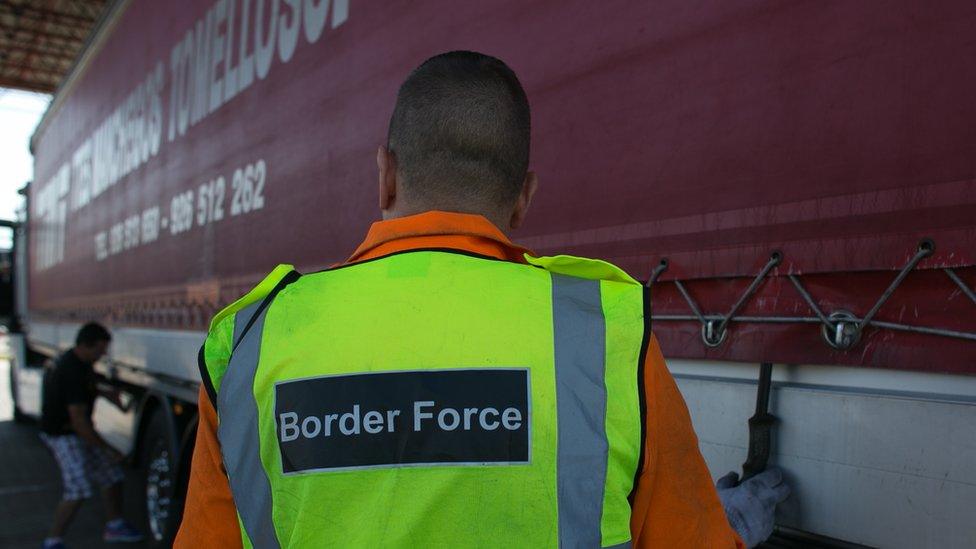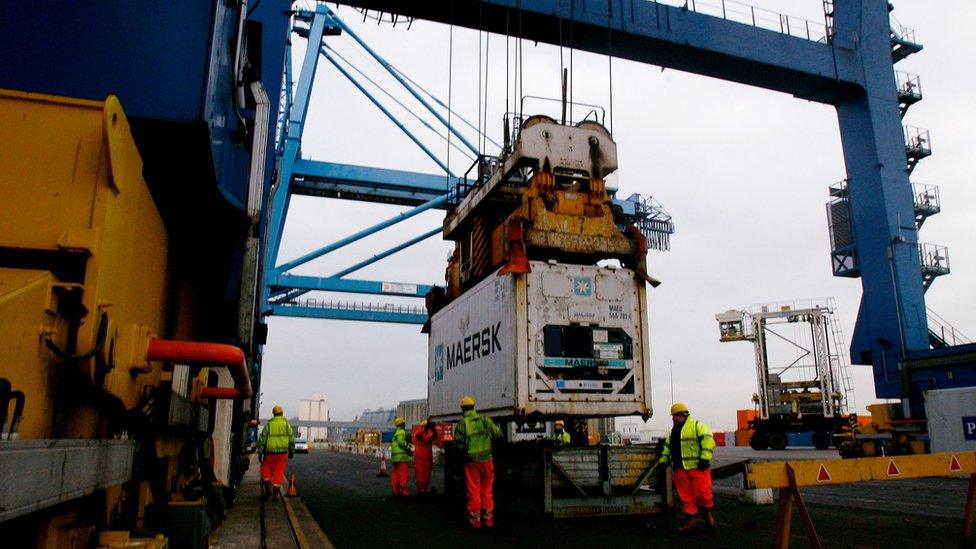Brexit: The traders who aren't (yet) trusted
- Published

We've heard a lot about so-called trusted traders.
They featured in the government's post-Chequers white paper, external for our future relationship with the European Union. They featured in the European Research Group's proposals, external for what should happen at the Irish border.
In fact, alongside largely unspecified "technology", trusted trader schemes seem to be a key plank of the strategy to keep trade flowing after Brexit.
But what are they?
There are various schemes that could fall under this umbrella. But the largest and best known is Authorised Economic Operator status (AEO), an EU scheme that basically functions as a quality assurance badge.
It is a marker that a manufacturer, logistics operator or freight handler meets certain standards in their customs related activities. These are companies that have shown their controls are up to scratch and so should get a quicker path through customs, involving fewer checks.
But there are problems with putting too much faith in this system as a way to keep goods moving after March 2019 - at least in the near term.
For one, there remains a question over how motivated traders are to sign up to the current system. And even amongst those who do see value in it, some will find they're not even able to apply.
There are only about 600 UK businesses registered as AEOs, compared to over 6,000 in Germany. The government argues that about 60-70% of the goods imported and exported into the UK are covered by the scheme.

Tilbury Dock's operator is acquiring trusted trader status
But that still leaves a long tail of smaller exporting businesses that haven't taken the time (and spent the money) to get certified.
Industry experts say many of those aren't clear on the benefits of the current scheme, in part perhaps because the potential issues and challenges presented by Brexit simply haven't arisen before.
That's one reason that we are likely to get a new trusted trader scheme after Brexit - one that could include more explicit benefits for those signing up. (The other, bigger reason is that the UK will probably need its own scheme after leaving, which would then have to be recognised by the EU.)
Port activity
More businesses are looking at AEO as one way to try to prepare before our departure next March.
According to industry sources, several port groups have been going through the process of getting their sites accredited and more applications are in the pipeline.
Forth Ports - which owns Tilbury, Grangemouth, Leith and Rosyth - has said it has got the status for its largest ports. Newsnight understands that Associated British Ports, the largest group with 21 UK ports, is going through the process of getting its ports accredited, and other groups are starting to do the same.
For ports, there are some clear advantages. The AEO badge means a waiver on financial guarantees the port must provide on goods held at its facilities, on which duty might need to be paid. The status can also speed up the process of applying for other types of customs accreditations.
And that is one factor that other parts of the supply chain are also starting to focus on. Getting the AEO badge now might be of debatable value. But going through the process of getting accredited - which can take at least six months of preparation work and processing time - could (and should) put operators in pole position for a quick sign-up to any new schemes.
Locked out
But there is a problem. The scheme is open to businesses currently involved in international trade activities covered by customs legislation.
So that means you need to be involved in non-EU trade at the moment in order to be able to apply.
Those who are only trading with the EU are locked out of the biggest trusted trader scheme we have until we actually leave. So much for contingency planning.
There's talk in the sector that this is a headache for certain UK ports, who only currently handle EU cargo. It could also be a problem for hauliers.
And it's an issue for businesses. This House of Lords, external report reckons there are 145,000 VAT-registered UK businesses that currently trade only with the EU, and there might be another 100,000 under the VAT threshold.
Trusted trader schemes could become a more important part of UK trade after Brexit. But - like so many things - they aren't entirely straight-forward. And they won't be ready on day one.
You can watch Newsnight on BBC 2 weekdays at 22:30 or on iplayer. Subscribe to the programme on YouTube, external and follow it on Twitter, external.
- Published27 September 2018
- Published8 October 2018
